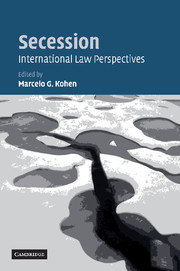Book contents
- Frontmatter
- Contents
- List of contributors
- Preface
- Table of cases
- Table of international instruments
- List of abbreviations
- Introduction
- PART I The Foundations of International Law and Their Impact on Secession
- 1 Secession and self-determination
- 2 Secession, terrorism and the right of self-determination
- 3 Secession and external intervention
- 4 The role of recognition in the law and practice of secession
- 5 The State as a ‘primary fact’: some thoughts on the principle of effectiveness
- 6 A normative ‘due process’ in the creation of States through secession
- 7 Secession and the law of State succession
- 8 Are there gaps in the international law of secession?
- PART II International and Domestic Practice
- 15 Conclusions
- Select bibliography
- Index
6 - A normative ‘due process’ in the creation of States through secession
Published online by Cambridge University Press: 23 July 2009
- Frontmatter
- Contents
- List of contributors
- Preface
- Table of cases
- Table of international instruments
- List of abbreviations
- Introduction
- PART I The Foundations of International Law and Their Impact on Secession
- 1 Secession and self-determination
- 2 Secession, terrorism and the right of self-determination
- 3 Secession and external intervention
- 4 The role of recognition in the law and practice of secession
- 5 The State as a ‘primary fact’: some thoughts on the principle of effectiveness
- 6 A normative ‘due process’ in the creation of States through secession
- 7 Secession and the law of State succession
- 8 Are there gaps in the international law of secession?
- PART II International and Domestic Practice
- 15 Conclusions
- Select bibliography
- Index
Summary
Description of a paradigm: the factual nature of the creation of States
Traditionally, from Jellinek onwards, it has always been affirmed that the formation or disappearance of a State is a pure fact, a political matter, remaining outside the realm of law (which does not create States but presupposes their existence as de facto sovereign entities.)
Consequently, it has long been a widely held assumption that international law neither prohibits nor authorizes secession, but simply acknowledges the result of de facto processes which may lead to the birth of new States. These phenomena represent factual rearrangements of power and do not amount to the successful exercise of a legal right, existing a priori, or ante rem (before the fact). This implies the absence of norms giving rise to the right to independence to any ethnic, religious or linguistic group whatsoever.
In cases of secession, the normal requirements for statehood – a permanent population, a territory and an independent government – would only be applied more strictly than would be required in cases of dissolution (where the parent State ceases to exist) or devolution (which happens with the consent of the parent State). With secession being a unilateral act which occurs without the consent of the parent State, the seceding entity has to struggle to establish effective control in the face of a presumption in favour of the integrity and effectiveness of the territorial State.
- Type
- Chapter
- Information
- SecessionInternational Law Perspectives, pp. 171 - 207Publisher: Cambridge University PressPrint publication year: 2006
- 17
- Cited by



